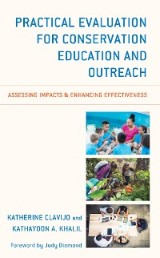Details

Practical Evaluation for Conservation Education and Outreach
Assessing Impacts & Enhancing Effectiveness|
36,99 € |
|
| Verlag: | Rowman & Littlefield Publishers |
| Format: | |
| Veröffentl.: | 15.02.2020 |
| ISBN/EAN: | 9781538109304 |
| Sprache: | englisch |
| Anzahl Seiten: | 192 |
DRM-geschütztes eBook, Sie benötigen z.B. Adobe Digital Editions und eine Adobe ID zum Lesen.
Beschreibungen
<span>Here are the tools and skills needed to conduct meaningful, comprehensive evaluations<br><br>How do we know if a conservation education or outreach program is working? <br><br>Practical Evaluation for Conservation Education and Outreach: Assessing Impacts & Enhancing Effectiveness presents a simple approach to using evaluation to design, monitor and assess education and outreach. It is for anyone whose organization or work involves creating educational programs designed to raise conservation awareness and promote pro-conservation behaviors.<br><br>Even more than a how-to book, it can help you to build your organization’s capacity to conduct meaningful, comprehensive evaluations. The book’s purpose is to provide specific skills and knowledge that they can immediately put to use in conducting evaluation studies of conservation education programs.<br><br>The reader will build an understanding that: <br>- Evaluation yields useful information <br>- Evaluation should be a part of a program’s design process <br>- Evaluation can be a positive experience <br>- Evaluation contributes to conservation education and outreach program’s success <br><br>The reader will build their knowledge of: <br>- Key evaluation terms and concepts <br>- The relationship between evaluation and research <br>- How evaluation processes and finding can contribute to decision making <br>- The strengths and weaknesses of different evaluation approaches and data collection methods<br>- The relationship among a program’s goals, objective, activities and expected outcomes <br><br>The readers will be able to <br>- Develop and refine key evaluation questions <br>- Review and contribute to an evaluation plan <br>- Construct and improve data-collection instruments <br>- Collect credible and reliable data <br>- Interpret results and draw conclusions <br><br>This book provides practical advice on conducting evaluation that is specific for conservation professionals. Case studies describe how evaluation has led to program improvements in a range of conservation settings. While there are numerous books that describe how to conduct program evaluation, none provide specific examples and tools relevant to improving environmental outcomes. </span>
<p><span>This book presents a simple approach to using evaluation to design, monitor, and assess conservation education and outreach. It is a practical tool for anyone create educational programs designed to raise conservation awareness and promote conservation behaviors.</span><br><br><span>. </span></p>
<span>Preface<br>Acknowledgements<br>PART I: Planning for Evaluation<br>Chapter 1. Tailoring the Evaluation<br>Chapter 2. Finding Focus and Asking Good Questions<br>Chapter 3. Logic Models: Defining the Big Picture<br>Chapter 4. Changing Hearts, Minds and Behaviors<br>PART II: Developing Data Collection Instruments<br>Chapter 5. Evaluation Methods and Designs<br>Chapter 6: Surveys<br>Chapter 7: Interviews, Focus Groups and Observations<br>Chapter 8: Alternative Approaches to Collecting Data<br>PART III: Analyzing Data, Presenting Findings and Making Evaluation Useful<br>Chapter 9 Analyzing Data<br>Chapter 10 Communicating Evaluation Results<br>Chapter 11 Developing a Collaborative Culture of Evaluation<br>Appendix<br>How to Hire and Work with an Evaluator<br>Summary of Program Evaluation Standards<br>Stewardship for Participants’ Information and IRB’s</span>
<span>Kate Clavijo</span>
<span> is a practicing program evaluator with more than 20 years of experience evaluating informal and formal educational programs. She served as the executive director of the Maryland Association for Environmental and Outdoor Education as is the lead author of the publication </span>
<span>Evaluation Use in Nonformal Education Settings</span>
<span> published by the American Evaluation Association. She has extensive experience in environmental education and a strong interest in evaluation capacity building. Dr. Clavijo earned her doctorate in Educational Program Evaluation and Masters degrees in Environmental Education and Biology at the University of Louisville.<br><br></span>
<span>Kathayoon Khalil</span>
<span> is the Conservation Impact Manager at the Oregon Zoo and the former Principal Evaluator for the Seattle Aquarium. She received her PhD in Learning Sciences and Technology Design from Stanford University, studying the use of social network analysis to understand how innovation in evaluation spreads among the zoo and aquarium community. Kathayoon started her career at as a teen volunteer at the Oregon Zoo and quickly developed a passion for wildlife and conservation. Kathayoon received her Masters of Environmental Science degree from the Yale School of Forestry and her Bachelors in Organismal Biology from Claremont McKenna College. She is an alumna of the Emerging Wildlife Conservation Leaders program as well as an instructor for Project Dragonfly at Miami University of Ohio.</span>
<span> is a practicing program evaluator with more than 20 years of experience evaluating informal and formal educational programs. She served as the executive director of the Maryland Association for Environmental and Outdoor Education as is the lead author of the publication </span>
<span>Evaluation Use in Nonformal Education Settings</span>
<span> published by the American Evaluation Association. She has extensive experience in environmental education and a strong interest in evaluation capacity building. Dr. Clavijo earned her doctorate in Educational Program Evaluation and Masters degrees in Environmental Education and Biology at the University of Louisville.<br><br></span>
<span>Kathayoon Khalil</span>
<span> is the Conservation Impact Manager at the Oregon Zoo and the former Principal Evaluator for the Seattle Aquarium. She received her PhD in Learning Sciences and Technology Design from Stanford University, studying the use of social network analysis to understand how innovation in evaluation spreads among the zoo and aquarium community. Kathayoon started her career at as a teen volunteer at the Oregon Zoo and quickly developed a passion for wildlife and conservation. Kathayoon received her Masters of Environmental Science degree from the Yale School of Forestry and her Bachelors in Organismal Biology from Claremont McKenna College. She is an alumna of the Emerging Wildlife Conservation Leaders program as well as an instructor for Project Dragonfly at Miami University of Ohio.</span>


















